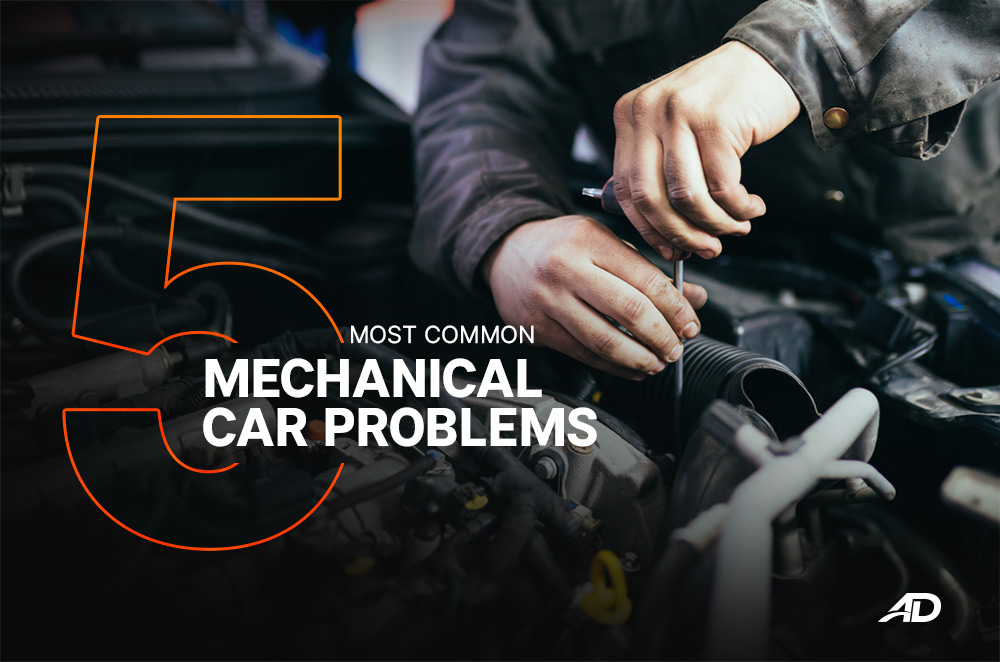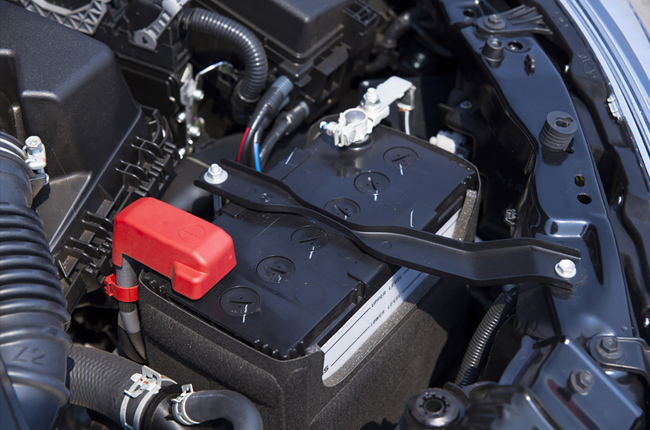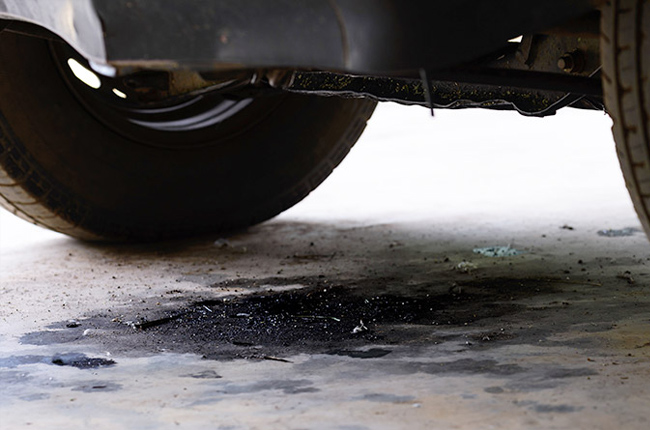
Encountering car problems is part of the ownership experience. A car owner will experience these at least once during their time with their vehicle, which can lead to inconvenient and stressful situations. These problems often arise due to wear and tear, and can occur at any given time. With that said, here are 5 common mechanical car problems you will encounter and how you can detect them ahead of time.
Flat tire

One of the most common problems that any car owner will face is a flat tire. It can happen any time and it’s hard to detect when it’s about to happen. When you encounter a flat tire, it is best to pull your vehicle over to a safe and well-lit area. Make sure your handbrake is up when lifting up the vehicle to ensure that it does move. You can also place a rock behind any of the wheels diagonal to the one that will need to be lifted from the ground. It will serve as a chock to prevent your car from rolling forward in case the brakes aren’t strong enough.
From there, you can proceed with jacking up enough so that the jack itself is supporting the car but not too high to lift the entire tire off the ground. Then you can loosen the nuts holding the wheel to the hub and proceed with a tire change. Make sure to also put the spare wheel under the vehicle near the jack to ensure your car doesn’t hit the ground in case the jack fails. Once you have swapped the tires, hand tighten the nuts in a star or cross pattern, lower the vehicle back onto the ground, and then retighten the nuts. Make sure to not over-torque the nuts, as they can cause damage to the threads of the bolt.
A dead or dying battery

A car’s battery has a finite life and will last anywhere between 3 to 5 years or more, depending on usage and brand. When the battery fails, this can leave you stranded as your vehicle will not be able to start. It can also lead to a costly replacement if you want the best battery available and one that can last you longer than the original. However, this is a relatively quick fix as car battery shops often have delivery services that can check on your battery and bring a new replacement unit to get you back on the road.
There are a few signs to watch out for to see if your vehicle is in need of a replacement battery. The first sign is usually that it has problems starting in the morning. Your vehicle may take longer to crank and get started, indicating that the voltage of the battery is low or is near the minimum range needed to get the motor going. You can also test your battery with a voltage tester to see if it still holds a charge above 12.4 volts. If it already dips below this threshold, it is highly recommended to replace the battery before it fails.
Alternator problems

Another common problem especially with older vehicles is a failing or dead alternator. It can happen at any time and even to newer models. The result of an alternator failing is the slow drain and slow shutdown of your vehicle’s electrical system. This means that once your battery runs out of power as the alternator is no longer capable of keeping it topped, your car will inevitably grind to a halt or will not be able to start. Alternators can also fail if their internal parts get too dirty thus reducing the part's ability to return a charge.
A few signs that your alternator is beginning to fail are: your dashboard throwing an electric warning light, your headlights beginning to slowly dim, strange sounds coming from your engine, strange smells from the engine, and finally, you experiencing difficulties starting your vehicle. If you notice these signs early, make sure you bring your vehicle to the service center or to a trusted auto shop to have it checked and/or fixed. If your alternator does end up just being dirty then you will be fine as all it will need is a good cleaning, however, if it is indeed broken a replacement will need to be bought.
Spark plugs

Another common part to fail especially if you do not have your vehicle maintained regularly is sparkplugs. These are in charge of adding spark to the combustion chamber which gives your vehicle’s engine the power it needs to move the car along. If your spark plugs fail, it could lead to your engine running rich to compensate, decreasing its efficiency, or worse running rough and vibrating harshly. White smoke may also even appear from your exhaust indicating incomplete combustion.
Early signs of your sparkplugs failing are a rough idle, trouble starting the engine, your engine misfiring, your engine surging, higher than normal fuel consumption, and a lack of acceleration. If you encounter any of these signs it’s highly recommended that you replace your sparkplugs immediately.
Oil and radiator leaks

Radiator leaks are another common problem a car owner will face at some point. These can happen at any time, and are difficult to spot, especially if the leak is small. What can happen, however, if left unchecked, is that your vehicle could overheat and cause damage to the engine. When there is no coolant present in the cooling system there is no way for your engine to effectively cool off.
A few signs that will pop up when your radiator has leaked include coolant or water dripping or forming under your vehicle after you park it. Is important to note that your air conditioning system also produces water, so it is necessary that you have your vehicle parked for a few hours to determine if there is a leak or not. The leak will often be colored depending on what coolant is used, making it easier to spot. This is also one of the reasons why manufacturers use colored coolant instead of clear liquid. Once you have detected a leak, make sure to bring your vehicle to a trusted auto shop or to the service center to have it checked. This way, the shop can easily determine where the leak is coming from and figure out what needs to be done to remedy it or if replacement parts are needed.

Similar to radiator leaks, oil leaks are also a common problem a car owner will face throughout their experience with the vehicle. Like radiator leaks, these can be harder to detect once they have started. As your oil protects your engine, it is important to have enough of it around. It also helps cool the motor, and as such having too little of it will cause it to overheat or force the cooling system to work harder.
These leaks can also be attributed to broken or worn-out seals. These components break down over time due to the constant heat from the engine, and as such need to be replaced regularly with every service. Your owner’s manual will help you determine which oil seals will need to be replaced at a certain time.
Early signs of a vehicle having an oil leak are: presence of oil under the vehicle after being parked, noticeable dirt mixed with oil in the engine bay, and an overheating engine. If you think your car has an oil leak, bring it to an auto shop or to the service center for a better diagnosis of the situation. They can more easily determine where the leak is and what parts are to be replaced.
An uncommon occurrence

Aircon problems
While not as common as the other problems listed above your air conditioning system can still fail. As a key system that helps you keep cool while stuck in traffic and during the hot summers is your air conditioning system. It works hard to keep the cabin at a nice, cool temperature. Throughout your car’s lifetime, your air conditioning system will need servicing at one point or another. When it fails, only your blower will be left standing, drastically reducing the ability of the system to cool your cabin. As your vehicle is effectively a metal box, you will feel the effects of the outside temperature much more easily than you did before.
Signs that your vehicle’s air conditioning system is dying are when the cooling effect is reduced, and when it struggles to cool your vehicle even with the thermostat cranked to the coldest setting. When you notice these signs, bring your vehicle to a trusted aircon shop or to the service center to have it fixed. Having a weaker cooling system could be that one of its components is failing or that there is a leak in the system that needs to be repaired.
If you want to prevent these problems from happening, regular cleaning and maintenance are the key. This way you can avoid these problems and even address them before they get worse. Also, having a clean engine bay and vehicle will make it easier to spot these problems in the event that they make their presence known. Make sure to also do research for highly recommended shops in case going to a service center is not an option.
Latest Features
-
The 6 things every Ford Ranger must pass before it leaves the factory / Featured Article
Every Ford Ranger, from the base model to the Ranger Raptor, goes through a full inspection process before it leaves the factory. This includes six steps that make sure it’s ready to drive a...
-
Which GAC AION EV is best for your everyday lifestyle? / Featured Article
The GAC AION lineup has something for everyone, maybe you're after space, speed, or just a smooth city drive. Here's a quick breakdown of which model might work best for your day-to-day life...
-
The AutoDeal Awards 2024: Celebrating excellence in the auto Industry / Featured Article
The AutoDeal Awards 2024: Celebrating excellence in the auto Industry
Popular Articles
-
Cheapest cars under P700,000 in the Philippines
Jerome Tresvalles · Sep 02, 2024
-
First car or next car, the Ford EcoSport is a tough package to beat
Jun 18, 2021
-
Car Maintenance checklist and guide – here’s everything you need to know
Earl Lee · Jan 12, 2021
-
Most fuel efficient family cars in the Philippines
Bryan Aaron Rivera · Nov 27, 2020
-
2021 Geely Okavango — Everything you need to know
Joey Deriquito · Nov 19, 2020
-
Family cars in the Philippines with the biggest trunks
Sep 20, 2023
-
Head to head: Toyota Rush vs. Suzuki XL7
Joey Deriquito · Oct 28, 2020
-
Why oil changes are important for your car
Earl Lee · Nov 10, 2020
-
2021 Kia Stonic — What you need to know about it
Joey Deriquito · Oct 16, 2020
-
Top 7 tips for buying a used car in the Philippines
Joey Deriquito · Nov 26, 2020



